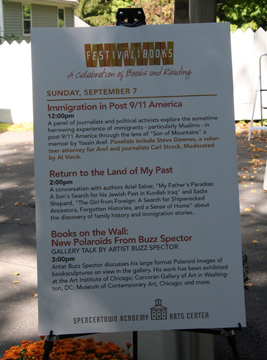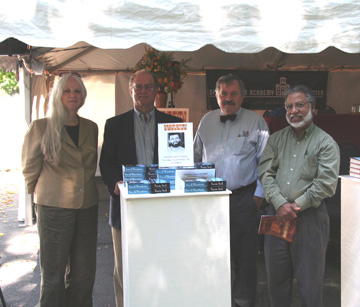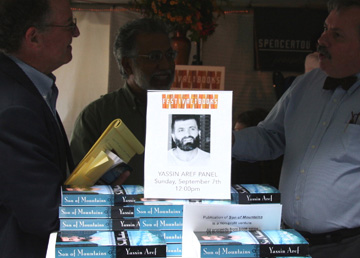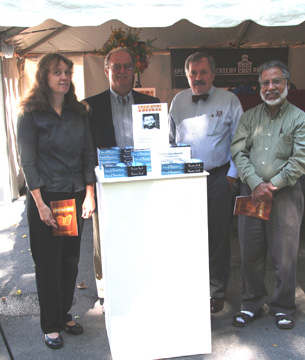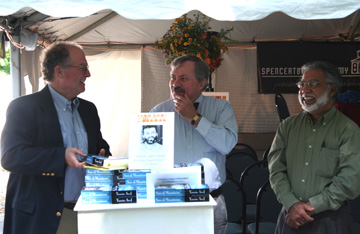|
Son of Mountains
|
On September 7, at the Spencertown Festival of Books, Yassin Aref's book Son of Mountains was featured. Also, a panel discussion was held about the book and the persecution of Muslims in the post-9/11 world. Here is the essay Yassin wrote for the event (or click here to download a pdf):
ABOUT SON OF MOUNTAINS
By Yassin Aref
Philosophers and historians may disagree about when and where civilizations started on this earth, but there is good evidence that humans lived in the mountains before moving to the flat land. Maybe this is why my people, the Kurds, and many other mountain people claim that they are the original human beings on earth, and why they are proud of their mountains, even though life there is very tough and hard. The Kurds stake their claim to being the oldest people on two facts. Neanderthal peoples were found to have lived in caves in Shanidar, a region of Kurdistan, thousands of years before recorded history. Moreover, all three great religious books, the Torah, the Bible, and the Qur’an, speak of the flood that destroyed all life at the time of Noah, except for the animals that Noah saved in his ark. Since the ark came to rest on the Kurds’ mountain, Ararat, and all life was restored from there, the Kurds can claim to have been the first people to repopulate the earth.
I am the son of that mountain, and I belong to one of the oldest peoples on this earth. And yet I do not have a country that I can call my own. Kurdistan does not exist on any map. The Kurds’ land is split into five pieces and ruled separately by Turkey, Iraq, Iran, Syria, and Armenia. My book, Son of Mountains, is my memory of my life’s story, but I believe it is not just mine but also my nation’s story. I was not rare or special, and whatever happened to me happened also to millions of Kurds, many of whom suffered much more than I did. Son of Mountains is the real story of life under a brutal dictator and the effect of thirty years of war and genocide on people treated as second- and third-class citizens. It is a story of the pain and suffering in their lives and the way they struggled to survive. It is not fiction, nor is it an exaggeration. I wanted the Western reader, who lives today on a totally different planet, to see and know some things about our cause and what we Kurds stand for, because knowing the disease is half of the cure. My hope is that Son of Mountains will bring some support to our cause and reach people’s hearts so that they will have some sympathy for my nation.
Many of you are writers, and so I do not need to tell you about the importance of your work. Just try to imagine how it would be if there were no writing. We might try to imagine back to the Stone Age, when people lived in caves and slept on rocks, used rocks to hunt for food, and had no pen or paper. Yet even Stone Age people were writing on rocks, painting pictures to transfer their experiences to their children and to teach the next generation about life. We have an idea about their lives––about the animals they hunted and the food they ate––from the pictures they made on the rock walls of their caves. If not for these picture-histories, we would not know anything about them.
Humans make history, but writers save it and share it with people and transfer it to future generations. Writers are the bridges between peoples and nations, allowing them to exchange their experiences and come to understand each other. Many people do not know or understand their own situation until they read something about it. This is the power of writing: that it can teach people even about their own situation by helping them share in the experience and history of others. My father, who was illiterate, told me a story when I was very young about an illiterate man who went to court to complain about some injustice. He was told that he had to put his complaint in writing, and so he hired a clerk to record his statement. The clerk asked him to tell his story, wrote it all down exactly as the man said, and then read it back to him to make sure it was accurate. The man began to weep and cry. The clerk was astonished and said, “What on earth is the matter? Why are you crying so hard?” The illiterate man replied, “Until I heard what you had written, I did not know that I had been treated so unjustly and how horribly I had been wronged.” Such is the power of writing.
It is not necessary to make up stories, or to exaggerate in order to touch people’s hearts and minds. It is enough simply to tell people’s stories as they really happened. I have told my story as it really happened, and I will be very happy to learn if any of you derive any benefit from it. Again, thank you very much for your time and for giving me this opportunity.
Updated
September 12, 2008
This site is maintained by Lynne Jackson of Jackson's Computer Services |
